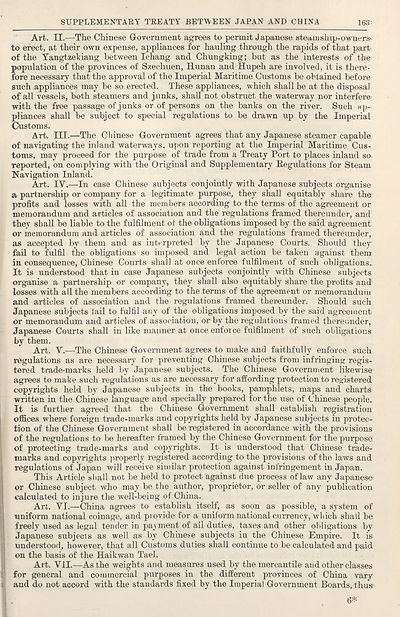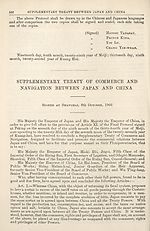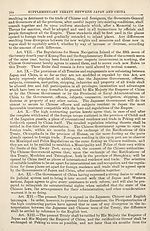1917
(243) Page 163
Download files
Complete book:
Individual page:
Thumbnail gallery: Grid view | List view

SUPPLEMENTARY TREATY BETWEEN JAPAN AND CHINA
Art. II.—The Chinese Government agrees to permit Japanese steamship-owners-
to erect, at their own expense, appliances for hauling through the rapids of that part
of the Yangtzekiang between Ichang and Chungking; but as the interests of the
population of the provinces of Szechuen, Hunan and Hupeh are involved, it is there¬
fore necessary that the approval of the Imperial Maritime Customs be obtained before
such appliances may be so erected. These appliances, which shall be at the disposal
of all vessels, both steamers and junks, shall not obstruct the waterway nor interfere
with the free passage of junks or of persons on the banks on the river. Such ap¬
pliances shall be subject to special regulations to be drawn up by the Imperial
Customs.
Art, III.—The Chinese Government agrees that any Japanese steamer capable
of navigating the inland waterways, upon reporting at the Imperial Maritime Cus¬
toms, may proceed for the purpose of trade from a Treaty Port to places inland so
reported, on complying with the Original and Supplementary Regulations for Steam
Navigation Inland.
Art. IY.—In case Chinese subjects conjointly with Japanese subjects organise
a partnership or company for a legitimate purpose, they shall equitably share the
profits and losses with all the members according to the terms of the agreement or
memorandum and articles of association and the regulations framed thereunder, and
they shall be liable to the fulfilment of the obligations imposed by the said agreement
or memorandum and articles of association and the regulations framed thereunder,
as accepted by them and as interpreted by the Japanese Courts. Should they
fail to fulfil the obligations so imposed and legal action be taken against them
in consequence, Chinese Courts shall at once enforce fulfilment of such obligations-
It is understood that in case Japanese subjects conjointly with Chinese subjects
organise a partnership or company, they shall also equitably share the profits and1
losses with all the members according to the terms of the agreement or memorandum
and articles of association and the regulations framed thereunder. Should such
Japanese subjects fail to fulfil any of the obligations imposed by the said agreement
or memorandum and articles of association, or by the regulations framed thereunder,
Japanese Courts shall in like manner at once enforce fulfilment of such obligations
by them.
Art. Y.—The Chinese Government agrees to make and faithfully enforce such
regulations as are necessary for preventing Chinese subjects from infringing regis¬
tered trade-marks held by Japanese subjects. The Chinese Government likewise
agrees to make such regulations as are necessary for affording protection to registered
copyrights held by Japanese subjects in the books, pamphlets, maps and charts
written in the Chinese language and specially prepared for the use of Chinese people.
It is further agreed that the Chinese Government shall establish registration
offices where foreign trade-marks and copyrights held by Japanese subjects in protec¬
tion of the Chinese Government shall be registered in accordance with the provisions
of the regulations to be hereafter framed by the Chinese Government for the purpose
of protecting trade-marks and copyrights. It is understood that Chinese trade¬
marks and copyrights properly registered according to the provisions of the laws and
regulations of Japan will receive similar protection against infringement in Japan.
This Article shall not be held to protect against due process of law any Japanese
or Chinese subject who may be the author, proprietor, or seller of any publication
calculated to injure the well-being of China.
Art. YI.—China agrees to establish itself, as soon as possible, a system of
uniform national coinage, and provide for a uniform national currency, which shall be
freely used as legal tender in payment of all duties, taxes and other obligations by
Japanese subjects as well as by Chinese subjects in the Chinese Empire. It is
understood, however, that all Customs duties shall continue to be calculated and paid
on the basis of the Haikwan Tael.
Art. YH.—As the weights and measures used by the mercantile and other classes
for general and commercial purposes in the different provinces of China vary
and do not accord with the standards fixed by the Imperial Government Boards, thus
6*
Art. II.—The Chinese Government agrees to permit Japanese steamship-owners-
to erect, at their own expense, appliances for hauling through the rapids of that part
of the Yangtzekiang between Ichang and Chungking; but as the interests of the
population of the provinces of Szechuen, Hunan and Hupeh are involved, it is there¬
fore necessary that the approval of the Imperial Maritime Customs be obtained before
such appliances may be so erected. These appliances, which shall be at the disposal
of all vessels, both steamers and junks, shall not obstruct the waterway nor interfere
with the free passage of junks or of persons on the banks on the river. Such ap¬
pliances shall be subject to special regulations to be drawn up by the Imperial
Customs.
Art, III.—The Chinese Government agrees that any Japanese steamer capable
of navigating the inland waterways, upon reporting at the Imperial Maritime Cus¬
toms, may proceed for the purpose of trade from a Treaty Port to places inland so
reported, on complying with the Original and Supplementary Regulations for Steam
Navigation Inland.
Art. IY.—In case Chinese subjects conjointly with Japanese subjects organise
a partnership or company for a legitimate purpose, they shall equitably share the
profits and losses with all the members according to the terms of the agreement or
memorandum and articles of association and the regulations framed thereunder, and
they shall be liable to the fulfilment of the obligations imposed by the said agreement
or memorandum and articles of association and the regulations framed thereunder,
as accepted by them and as interpreted by the Japanese Courts. Should they
fail to fulfil the obligations so imposed and legal action be taken against them
in consequence, Chinese Courts shall at once enforce fulfilment of such obligations-
It is understood that in case Japanese subjects conjointly with Chinese subjects
organise a partnership or company, they shall also equitably share the profits and1
losses with all the members according to the terms of the agreement or memorandum
and articles of association and the regulations framed thereunder. Should such
Japanese subjects fail to fulfil any of the obligations imposed by the said agreement
or memorandum and articles of association, or by the regulations framed thereunder,
Japanese Courts shall in like manner at once enforce fulfilment of such obligations
by them.
Art. Y.—The Chinese Government agrees to make and faithfully enforce such
regulations as are necessary for preventing Chinese subjects from infringing regis¬
tered trade-marks held by Japanese subjects. The Chinese Government likewise
agrees to make such regulations as are necessary for affording protection to registered
copyrights held by Japanese subjects in the books, pamphlets, maps and charts
written in the Chinese language and specially prepared for the use of Chinese people.
It is further agreed that the Chinese Government shall establish registration
offices where foreign trade-marks and copyrights held by Japanese subjects in protec¬
tion of the Chinese Government shall be registered in accordance with the provisions
of the regulations to be hereafter framed by the Chinese Government for the purpose
of protecting trade-marks and copyrights. It is understood that Chinese trade¬
marks and copyrights properly registered according to the provisions of the laws and
regulations of Japan will receive similar protection against infringement in Japan.
This Article shall not be held to protect against due process of law any Japanese
or Chinese subject who may be the author, proprietor, or seller of any publication
calculated to injure the well-being of China.
Art. YI.—China agrees to establish itself, as soon as possible, a system of
uniform national coinage, and provide for a uniform national currency, which shall be
freely used as legal tender in payment of all duties, taxes and other obligations by
Japanese subjects as well as by Chinese subjects in the Chinese Empire. It is
understood, however, that all Customs duties shall continue to be calculated and paid
on the basis of the Haikwan Tael.
Art. YH.—As the weights and measures used by the mercantile and other classes
for general and commercial purposes in the different provinces of China vary
and do not accord with the standards fixed by the Imperial Government Boards, thus
6*
Set display mode to:
![]() Universal Viewer |
Universal Viewer | ![]() Mirador |
Large image | Transcription
Mirador |
Large image | Transcription
Images and transcriptions on this page, including medium image downloads, may be used under the Creative Commons Attribution 4.0 International Licence unless otherwise stated. ![]()
| Asian directories and chronicles > 1917 > (243) Page 163 |
|---|
| Permanent URL | https://digital.nls.uk/194535467 |
|---|
| Attribution and copyright: |
|
|---|---|
| Description | Volumes from the Asian 'Directory and Chronicle' series covering 1917-1941, but missing 1919 and 1923. Compiled annually from a multiplicity of local sources and research. They provide listings of each country's active corporations, foreign residents and government agencies of all nationalities for that year, together with their addresses. Content includes: various treaties; coverage of conflicts; currencies and taxes; consular fees; weights and measures; public holidays; festivals and traditions. A source of information for both Western states and communities of foreigners living in Asia. Published by Hongkong Daily Press. |
|---|---|
| Shelfmark | H3.86.1303 |
| Additional NLS resources: |

